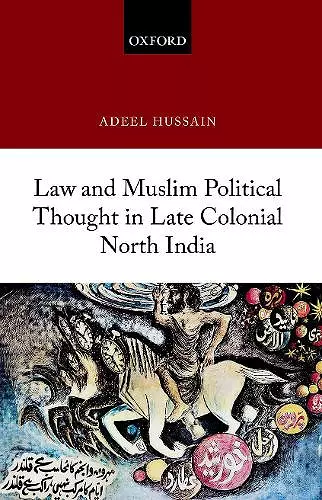Law and Muslim Political Thought in Late Colonial North India
Format:Hardback
Publisher:Oxford University Press
Published:23rd Aug '22
Currently unavailable, and unfortunately no date known when it will be back

During the 1930s, much of the world was in severe economic and political crisis. This upheaval ushered in new ways of thinking about social and political systems. In some cases, these new ideas transformed states and empires alike. Particularly in Europe, these transformations are well-chronicled in scholarship. In academic writings on India, however, Muslim political and legal thought has gone relatively unnoticed during this eventful decade. This book fills this gap by mapping the evolution of Muslim political and legal thought from roughly 1927 to 1940. By looking at landmark court cases in tandem with the political and legal ideas of Muhammad Iqbal and Muhammad Ali Jinnah, Pakistan's founding fathers, this book highlights the more concealed ways in which Indian Muslims began to acquire a political outlook with distinctly separatist aspirations. What makes this period worthy of a separate study is that the legal antagonism between religious communities in the 1930s foreshadowed political conflicts that arose in the run-up to independence in 1947. The presented cases and thinkers reflect the possibilities and limitations of Muslim political thought in colonial India.
Offering a striking new perspective on the making of Muslim politics in colonial India, Adeel Hussain argues that law and legal thinking came to comprise its primary site. Rather than sulking in their tents and taking to religion with the establishment of British rule, Muslims deployed the law to shape the colonial state as well as remake themselves into a polity without sovereignty. In the process, Hussain gives us a novel interpretation of political thought in colonial societies. * Faisal Devji, Professor of Indian History, University of Oxford *
A new generation of young historians is redefining history itself as a way of grasping the meaning of certain traumatic political events of the past. Adeel Hussain brings a rare combination of expertise in history, law and the postmodernist innovations in interpretation of what were thought to be 'objective facts' to open up new questions about the nature of nationality and its relation to religion, of the legitimacy of Law as a solvent for disputes, and of the different ways of understanding the nature of the subaltern subjects. The fruits of his efforts are new ways of understanding the traumatic event of the Partition of British India. His book is erudite, compelling and a great read. * Meghnad ( Lord) Desai, Member of the House of Lords, Professor Emeritus of Economics, London School of Economics *
This is a remarkably lucid narration of a very complex phenomena in which law and philosophical discourse intersect in a bid to explicate historical situation. Adeel Hussain unravels the political and legal intricacies that punctuated the last two decades of united India. He has shed fresh light on the twists and turns that Muslim factional politics took in the run-up to partition. It indeed makes a pithy and profound reading. * Tahir Kamran, Professor of History, Beaconhouse National University *
ISBN: 9780192859778
Dimensions: 223mm x 144mm x 18mm
Weight: 436g
248 pages